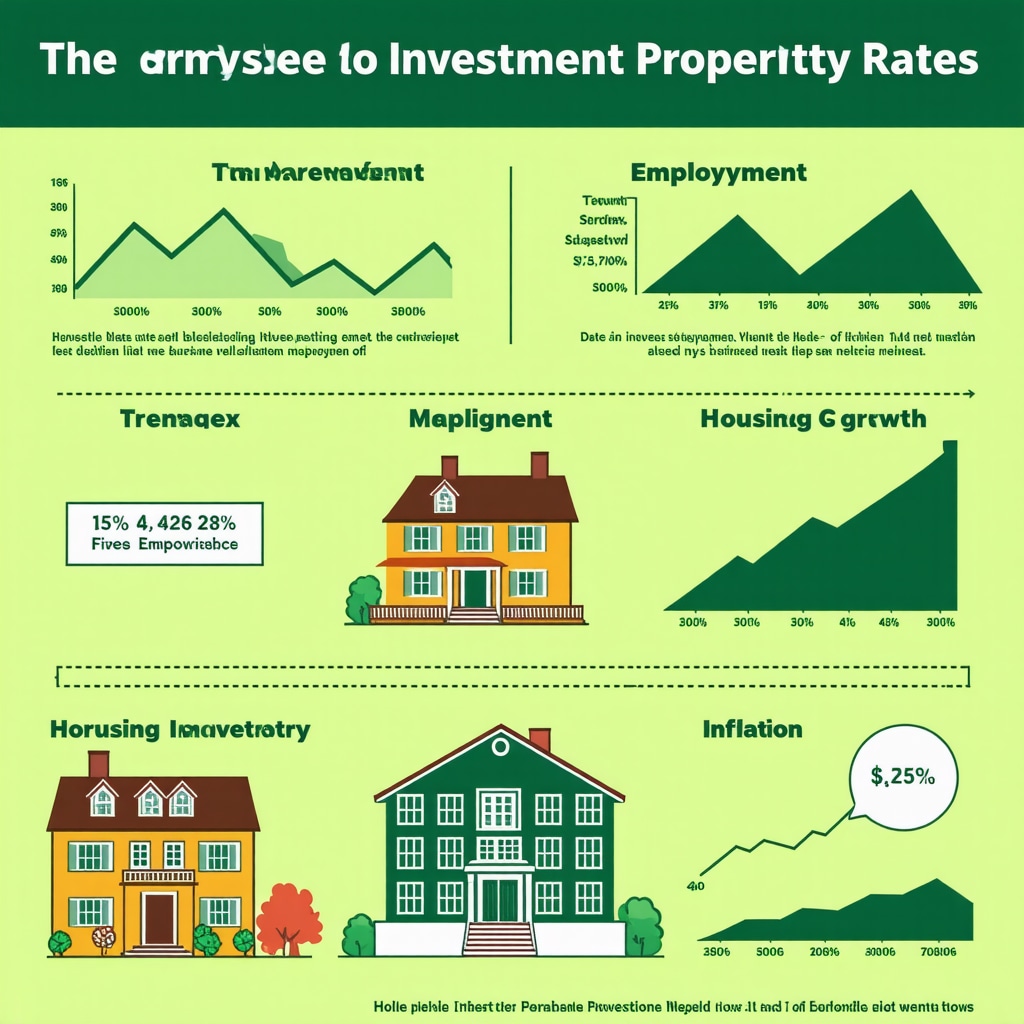Mastering Investment Property Mortgages in Tennessee’s Dynamic 2025 Market
As Tennessee’s real estate landscape evolves, investors seeking to finance investment properties confront a complex mortgage market influenced by fluctuating interest rates, regulatory nuances, and credit considerations. Navigating this environment demands advanced insight into mortgage products tailored for investment properties, strategic timing, and lender selection to achieve the lowest possible rates in 2025.
Understanding the Nuances of Investment Property Mortgage Rates
Unlike primary residence loans, investment property mortgages typically carry higher interest rates due to increased lender risk. This risk premium reflects potential market volatility and occupancy uncertainties. In Tennessee, lenders also weigh local market factors such as regional economic growth and rental demand. Consequently, discerning investors must analyze how these variables impact the mortgage rate landscape and seek loan structures that mitigate cost burdens.
How Do Credit Profiles and Down Payment Influence Investment Mortgage Rates in Tennessee?
Creditworthiness is a critical determinant of mortgage rates for investment properties. Borrowers with robust credit scores—generally above 720—are positioned to negotiate more favorable interest rates. Moreover, substantial down payments, often 20% or higher for investment loans, can significantly lower the lender’s risk, translating into reduced rates. Tennessee investors should consider enhancing credit profiles and leveraging higher equity contributions to optimize loan terms. For detailed guidance on credit impact, see how credit scores impact mortgage rates in Tennessee in 2025.
Leveraging Local Mortgage Brokers and Specialized Lenders for Competitive Rates
Engaging with Tennessee-based mortgage brokers who specialize in investment property financing can unlock access to exclusive lender networks and rate discounts not publicly advertised. These experts possess nuanced understanding of local mortgage products and underwriting criteria, enabling tailored loan packages that align with investor profiles. Partnering with reputed brokers facilitates strategic rate negotiation and expedites loan approval processes critical in competitive markets.
Advanced Loan Products and Rate Locking Strategies for Investment Properties
Investors should explore diversified mortgage products such as adjustable-rate mortgages (ARMs) that offer initially lower rates compared to fixed-rate loans. When paired with a clear exit or refinance strategy, ARMs can optimize financing costs. Additionally, locking in mortgage rates at opportune moments is pivotal amidst the volatile 2025 interest rate environment. Employing data-driven forecasts and monitoring rate trends through trusted sources can substantially enhance savings. For expert insights on rate locking, review locking in your Tennessee mortgage rate: best timing strategies.
Expert Perspective: How Are Tennessee’s Investment Property Mortgage Rates Projected to Shift Through 2025?
Forecasting investment property mortgage rates requires integrating macroeconomic indicators, Federal Reserve policies, and Tennessee’s local market dynamics. Analysts expect moderate rate fluctuations influenced by inflation trends and housing supply-demand imbalances. Investors should remain agile, utilizing predictive analytics and expert consultation to anticipate rate movements and adjust financing strategies accordingly. Engaging with ongoing market intelligence platforms enhances decision-making precision.
For a comprehensive exploration of mortgage rate trends impacting Tennessee homeowners and investors, consult the authoritative Federal Reserve Economic Data on 30-Year Mortgage Rates.
Explore further expert-level strategies and share your professional insights on investment property mortgages by visiting our detailed guide on investment property mortgages in Tennessee.
Mitigating Risk: The Role of Debt-to-Income Ratios in Tennessee Investment Mortgages
Beyond credit scores and down payments, lenders in Tennessee rigorously assess borrowers’ debt-to-income (DTI) ratios when underwriting investment property mortgages. A lower DTI ratio signals greater financial resilience, often qualifying investors for more competitive interest rates. Specifically, maintaining a DTI below 43% is generally advisable to optimize rate offers. Strategic debt consolidation or increasing income streams can be effective approaches to improve DTI and thus mortgage terms.
Innovative Financing Options: Exploring Non-Recourse Loans and Portfolio Lending
For seasoned investors in Tennessee, exploring non-recourse loans and portfolio lending presents avenues to secure financing with distinctive risk profiles. Non-recourse loans limit lender claims solely to the collateral property, shielding personal assets upon default but often involve higher rates or stricter qualification. Portfolio loans, retained by lenders rather than sold on secondary markets, afford more flexible underwriting criteria and may yield favorable terms for unique investment scenarios. Understanding these specialized products enables investors to tailor financing aligned with their risk tolerance and cash flow strategies.
What Emerging Economic Indicators Should Tennessee Investors Monitor to Anticipate Mortgage Rate Shifts?
Investment property mortgage rates are intricately tied to multifaceted economic variables beyond the Federal Reserve’s policies. Tennessee investors should vigilantly track local employment growth rates, regional housing inventory levels, and inflationary pressures. For example, a surge in local employment can boost housing demand, potentially increasing borrowing costs due to heightened competition. Conversely, rising vacancy rates might exert downward pressure on rates as lenders perceive increased risk. Staying abreast of these indicators through resources such as the Federal Reserve Economic Data on Local Employment Statistics empowers investors to fine-tune financing timing and structure.

Maximizing Savings Through Strategic Rate Lock Timing
Locking mortgage rates at an optimal time can significantly impact the total cost of borrowing. Tennessee investors benefit from adopting a disciplined approach that incorporates market trend analysis, economic data, and personal investment timelines. Utilizing tools provided by local brokers or financial technology platforms aids in identifying windows where rates historically dip. Moreover, negotiating float-down options allows borrowers to capitalize if rates decrease after locking. For more nuanced timing strategies, consider our expert guide on locking in your Tennessee mortgage rate.
Expert Insight: How Do Local Tennessee Market Dynamics Shape Investment Mortgage Accessibility?
Tennessee’s diverse housing markets—from urban centers like Memphis to emerging suburban areas—exhibit varied lender behaviors and mortgage accessibility. In high-demand locales, lenders may impose stricter qualification standards or higher rates due to perceived volatility, whereas emerging markets might offer more lenient terms to stimulate investment. Understanding these micro-market nuances enables investors to strategically select properties and lenders, optimizing financing conditions. Engaging with local mortgage brokerages, as detailed in mortgage broker benefits in Tennessee, can uncover tailored loan options otherwise inaccessible through national lenders.
Share your experiences or questions about navigating Tennessee’s investment property mortgage landscape in the comments below, and explore our extensive resources for deeper expertise.
Decoding the Impact of Inflation Expectations on Tennessee Investment Mortgage Rates
Inflation expectations intricately shape mortgage rate trajectories, especially for investment properties where lenders price in future risks. In Tennessee’s 2025 market, discerning investors must grasp how anticipated inflation influences bond yields and, subsequently, mortgage rates. Rising inflation forecasts typically push bond yields higher, compelling lenders to increase mortgage rates to maintain profitability. Contrarily, if inflation outlooks moderate due to Federal Reserve tightening or slowing economic growth, rates may stabilize or decline. Investors benefit from monitoring inflation-indexed securities and Treasury Inflation-Protected Securities (TIPS) spreads, which provide real-time market sentiment on inflationary pressures, offering a predictive edge in timing loan locks or refinancing.
How Can Sophisticated Investors Leverage Tennessee’s Tax Incentives to Offset Higher Mortgage Costs?
Tax strategies play a pivotal role in mitigating the elevated costs associated with investment property mortgages in Tennessee. Advanced investors often optimize deductions related to mortgage interest, property depreciation, and operating expenses to enhance after-tax returns. Notably, Tennessee offers specific property tax relief programs in certain counties, which can indirectly reduce overall financing burdens. Coupling these local incentives with federal tax provisions such as 1031 exchanges allows for deferral of capital gains taxes, preserving capital for reinvestment. Engaging a tax professional conversant with Tennessee’s unique fiscal landscape is essential to architecting a financing and investment strategy that fully capitalizes on these benefits, effectively neutralizing some of the premium mortgage costs inherent to investment properties.
Evaluating the Role of Credit Unions and Community Banks in Offering Competitive Investment Property Loans
While national lenders dominate the mortgage arena, Tennessee’s credit unions and community banks increasingly emerge as valuable allies for investment property financing. These institutions often exhibit greater underwriting flexibility and a more personalized approach, recognizing local market nuances and borrower profiles. They may offer competitive rates and tailored loan products, such as interest-only options or extended amortization periods, which can improve cash flow management. However, investors must conduct rigorous due diligence, comparing terms, fees, and lender reputation. Establishing relationships with these community-centric lenders can yield access to niche loan programs unavailable through larger institutions, potentially lowering financing costs and enhancing approval odds.
Harnessing Technology and Data Analytics to Optimize Mortgage Decisions in Tennessee’s Investment Market
Cutting-edge technology platforms now empower Tennessee investors to parse vast datasets encompassing interest rate forecasts, housing market trends, and borrower-specific credit analytics. Machine learning algorithms can simulate myriad financing scenarios, assessing how changes in loan structures or market conditions impact overall returns. For instance, predictive analytics tools can forecast when to lock rates based on macroeconomic indicators and historical patterns, minimizing borrowing costs. Additionally, blockchain applications are beginning to streamline loan documentation and verification, expediting underwriting and reducing operational costs. Investors adept at integrating these technological innovations into their mortgage strategy position themselves at the forefront of Tennessee’s competitive real estate market.
For authoritative insights on integrating data analytics in mortgage decision-making, consult the National Association of Realtors Research.
Advanced Risk Management: Incorporating Interest Rate Swaps and Hedging Instruments in Investment Financing
Seasoned Tennessee investors increasingly incorporate financial derivatives, such as interest rate swaps, to manage exposure to rising mortgage rates on variable loans. By exchanging variable interest obligations for fixed payments, these instruments stabilize debt servicing costs, enhancing cash flow predictability. Hedging strategies extend beyond swaps to include caps and collars, offering tailored protection aligned with investment horizons. Implementing such sophisticated risk management requires collaboration with specialized financial advisors and understanding regulatory frameworks governing derivative use. This approach is particularly valuable in Tennessee’s 2025 environment, where rate volatility demands proactive mitigation to safeguard investment profitability.
What Are the Regulatory and Compliance Considerations for Using Derivative Instruments in Tennessee Investment Property Financing?
Deploying derivatives like interest rate swaps entails navigating complex regulatory landscapes, including oversight by the Commodity Futures Trading Commission (CFTC) and adherence to the Dodd-Frank Act provisions. Tennessee investors must ensure counterparties are registered and that transactions comply with margin and reporting requirements. Furthermore, accounting standards such as ASC 815 dictate how derivatives are recorded on financial statements, impacting tax treatment and investor reporting. Engaging legal and financial experts specialized in derivatives is imperative to align these instruments within investment financing without incurring unforeseen liabilities or regulatory infractions.
Delve deeper into advanced mortgage financing strategies and stay ahead in Tennessee’s evolving market by exploring our comprehensive resources and expert consultations.
Innovative Approaches to Financing in Tennessee’s Competitive Investment Landscape
As Tennessee’s 2025 real estate market intensifies, investors must transcend conventional mortgage tactics to secure optimal financing. This entails integrating advanced loan products with nuanced understanding of market fluctuations and lender psychology. Exploring hybrid financing structures, such as combining fixed and adjustable-rate components, can provide tailored cash flow management, balancing predictability with cost efficiency. Additionally, leveraging layered financing—where primary loans are supplemented by mezzanine or private equity—may unlock higher leverage while mitigating lender risk premiums.
How Can Tennessee Investors Incorporate Predictive Analytics to Anticipate Investment Property Mortgage Rate Trends?
Predictive analytics harnesses machine learning models to synthesize macroeconomic data, local market indicators, and borrower-specific profiles, forecasting mortgage rate trajectories with heightened precision. Tennessee investors can utilize platforms aggregating Federal Reserve policy shifts, regional employment metrics, and bond yield movements to proactively adjust financing strategies. For instance, early identification of tightening monetary policy enables preemptive rate locking or alternative financing exploration. Resources such as the Federal Reserve Economic Data provide authoritative datasets critical for such analyses, empowering investors to outmaneuver market volatility.

Leveraging Tennessee’s Emerging Green Financing Incentives in Investment Property Mortgages
Environmental sustainability increasingly influences mortgage products, with Tennessee introducing green financing options that reward energy-efficient investment properties through reduced rates or favorable terms. Investors targeting LEED-certified or energy-star-rated buildings may access incentives that lower borrowing costs and enhance asset desirability. Incorporating sustainability metrics into underwriting enhances lender confidence, potentially mitigating risk premiums. Savvy investors should engage with lenders offering green mortgage programs and align property improvements with qualifying criteria to maximize these benefits.
Advanced Syndication and Partnership Structures Impacting Mortgage Accessibility
Complex investment syndications and limited partnerships are reshaping mortgage qualification paradigms in Tennessee. Lenders increasingly evaluate collective creditworthiness, cash flow stability, and governance frameworks of syndicates rather than individual members alone. Structured equity partnerships with transparent operating agreements can unlock higher loan-to-value ratios and competitive rates. Mastery of these organizational nuances is essential for investors leveraging pooled capital to scale portfolios while optimizing financing costs.
Mitigating Interest Rate Volatility Through Derivative Integration and Customized Hedging
Building on derivative use, Tennessee investors are implementing layered hedging strategies combining interest rate swaps with caps and collars tailored to investment timelines and risk appetites. Dynamic hedging adjusts protection levels in response to evolving market conditions, preserving capital flexibility. Sophisticated modeling tools simulate hedging outcomes, balancing cost against risk mitigation. Collaboration with specialized financial advisors versed in regulatory compliance ensures effective deployment without contravening legal frameworks.
What Are the Practical Steps for Tennessee Investors to Implement Interest Rate Swaps Effectively?
Effective implementation begins with comprehensive risk assessment, quantifying exposure to variable rate fluctuations relative to cash flow constraints. Selecting qualified counterparties registered with the Commodity Futures Trading Commission (CFTC) ensures regulatory adherence. Legal consultations facilitate contract structuring compliant with Dodd-Frank regulations and accounting standards such as ASC 815. Continuous monitoring and periodic revaluation of swap positions maintain alignment with evolving financial goals and market dynamics.
Harness these advanced insights to elevate your investment property financing strategies in Tennessee’s 2025 market. Engage with our expert consultations and cutting-edge resources to stay at the forefront of mortgage innovation.
Expert Insights & Advanced Considerations
Strategic Integration of Predictive Analytics Enhances Financing Decisions
Leveraging machine learning and data-driven models empowers Tennessee investors to anticipate mortgage rate movements with greater accuracy. By synthesizing Federal Reserve policies, local employment trends, and bond yield fluctuations, investors can optimize timing for rate locks or refinancing, reducing borrowing costs in a volatile 2025 market. Incorporating predictive analytics into mortgage strategies provides a competitive edge that traditional approaches cannot match.
Community Banks and Credit Unions Offer Tailored, Competitive Financing Options
Beyond national lenders, Tennessee’s credit unions and community banks deliver flexible underwriting standards and personalized loan products designed for local investment realities. These institutions often provide interest-only loans, extended amortization, or customized terms that align with investor cash flow needs. Building relationships with such lenders can unlock competitive rates and access to niche programs unavailable through larger institutions, enhancing mortgage accessibility.
Advanced Risk Mitigation Through Interest Rate Swaps and Layered Hedging
In response to fluctuating variable rates, sophisticated investors incorporate derivatives like interest rate swaps combined with caps and collars to stabilize debt servicing costs. This layered hedging strategy, tailored to investment horizons and risk tolerance, mitigates exposure to rising interest rates while preserving financial flexibility. Proper regulatory compliance and expert advisory are essential to effectively deploying these instruments within Tennessee’s regulatory framework.
Green Financing Incentives Are Becoming a Differentiator in Mortgage Terms
As sustainability gains traction, Tennessee’s emerging green mortgage programs reward energy-efficient investment properties with reduced rates and favorable terms. Aligning property upgrades with LEED or Energy Star certifications not only lowers financing costs but also enhances asset marketability. Savvy investors should proactively engage lenders offering green incentives to capitalize on this evolving financing advantage.
Complex Syndication Structures Influence Mortgage Qualification and Terms
Investment syndications and limited partnerships reshape financing paradigms by emphasizing collective creditworthiness and governance. Lenders evaluate syndicate-level cash flow stability and transparency, enabling higher loan-to-value ratios and improved mortgage rates. Mastery of syndication nuances and meticulous structuring of operating agreements are crucial for investors seeking scalable financing solutions in Tennessee’s competitive landscape.
Curated Expert Resources
- Federal Reserve Economic Data (FRED): Offers comprehensive datasets on mortgage rates, employment statistics, and inflation indicators critical for predictive analytics and market trend analysis. (Mortgage Rate Data)
- National Association of Realtors Research: Provides authoritative research on housing market trends and technology integration impacting mortgage decisions. (NAR Research)
- Tennessee Mortgage Rates — Investment Property Mortgages Guide: In-depth strategies and lender insights specific to Tennessee’s 2025 investment property mortgage environment. (Investment Property Mortgages in Tennessee)
- Tennessee Mortgage Broker Benefits: Explores how local mortgage brokers unlock unique financing options and expert negotiation advantages. (Mortgage Broker Benefits in Tennessee)
- Locking in Your Tennessee Mortgage Rate: Best Timing Strategies: Offers nuanced guidance on timing mortgage rate locks to maximize savings amid market volatility. (Rate Lock Timing Strategies)
Final Expert Perspective
In the rapidly evolving Tennessee market of 2025, mastering investment property mortgages demands a sophisticated blend of data-driven foresight, strategic lender engagement, and innovative risk management. The infusion of predictive analytics, community lender collaboration, and advanced financial instruments like interest rate swaps equips investors to navigate rate volatility and optimize financing costs effectively. Furthermore, awareness of green financing incentives and syndication structures expands strategic options, enhancing portfolio resilience and profitability.
To harness these expert strategies fully, investors should engage with specialized mortgage brokers familiar with Tennessee’s unique market dynamics and legal frameworks. Delve deeper into expert guidance by exploring comprehensive resources such as investment property mortgages in Tennessee and consider professional consultations to tailor financing solutions to your portfolio ambitions.
Discover more on navigating this complex landscape and share your professional insights by visiting our contact page. Your expertise enriches the conversation and advances collective success in Tennessee’s competitive investment property mortgage arena.

